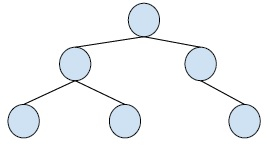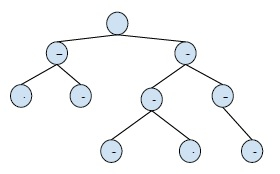
 Data Structure
Data Structure Networking
Networking RDBMS
RDBMS Operating System
Operating System Java
Java MS Excel
MS Excel iOS
iOS HTML
HTML CSS
CSS Android
Android Python
Python C Programming
C Programming C++
C++ C#
C# MongoDB
MongoDB MySQL
MySQL Javascript
Javascript PHP
PHP
- Selected Reading
- UPSC IAS Exams Notes
- Developer's Best Practices
- Questions and Answers
- Effective Resume Writing
- HR Interview Questions
- Computer Glossary
- Who is Who
Print common nodes on path from root (or common ancestors) in C++
In this problem, we are given a binary tree and two nodes of the binary tree are defined. And we have to print all the common ancestors of the node i.e. common nodes that occur in the path from traversal from root to the node.
Binary Tree is a special tree whose every node has at max two child nodes. So, every node is either a leaf node or has one or two child nodes.
Example,

Ancestor node is a node that is connected to lower-level nodes in a tree.
The common ancestor node of two nodes is a node that is an ancestor node of both nodes in a tree.
For example − 
In the above Binary tree, we have to find the common ancestor of 0 and 6.
Output − 3, 2
Now, based on this problem, let’s create an algorithm for solving this problem,
Algorithm
Step 1 : Find the lowest common ancestor of the two nodes of the given tree. And print it. Step 2 : Traverse upward to the root node and print all the nodes that come in the path.
Example
Now, let’s create a program to illustrate the solution of this problem,
#include <iostream>
using namespace std;
struct Node {
struct Node* left, *right;
int key;
};
Node* insertNode(int key){
Node* temp = new Node;
temp->key = key;
temp->left = temp->right = NULL;
return temp;
}
struct Node* LowestCommonAncestors(struct Node* root, int n1, int n2){
if (root == NULL)
return NULL;
if (root->key == n1 || root->key == n2)
return root;
Node* left_lca = LowestCommonAncestors(root->left, n1, n2);
Node* right_lca = LowestCommonAncestors(root->right, n1, n2);
if (left_lca && right_lca)
return root;
return (left_lca != NULL) ? left_lca : right_lca;
}
bool printAncestorNodes(struct Node* root, int target){
if (root == NULL)
return false;
if (root->key == target) {
cout << root->key << "\t";
return true;
}
if (printAncestorNodes(root->left, target) ||
printAncestorNodes(root->right, target)) {
cout << root->key << "\t”;
return true;
}
return false;
}
bool printcommonAncestors(struct Node* root, int first, int second){
struct Node* LCA = LowestCommonAncestors(root, first, second);
if (LCA == NULL)
return false;
printAncestorNodes(root, LCA->key);
}
int main(){
Node* root = insertNode(24);
root->left = insertNode(8);
root->right = insertNode(69);
root->left->left = insertNode(12);
root->left->right = insertNode(41);
root->right->left = insertNode(50);
root->right->right = insertNode(3);
root->left->left->left = insertNode(22);
root->right->left->left = insertNode(10);
root->right->left->right = insertNode(6);
if (printcommonAncestors(root, 6, 3) == false)
cout << "No Common nodes";
return 0;
}
Output
69 24

